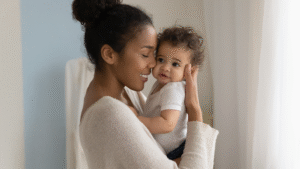In this Episode
Have you asked yourself how you are doing today? Have your doctor asked about your mental health during your baby check-ups? How do you know if your mood is being affected by the pregnancy/postpartum hormone changes, or if what you’re feeling are symptoms of depression or anxiety? Can dads have postpartum depression? How does self-care look like as a new parent? Join us as we chat about mental health and self-care during pregnancy and as a new parent, how to identify the signs that something is not going well, and the importance of having a “game plan” for challenging parenting situations, so you can keep your cool in moments of crisis.
Key points:
- The hormonal changes during pregnancy can affect the mom’s mood.
- The same is true for after the baby is born. Some hormonal levels in the mom’s body drop and it is normal to feel the “baby blues”, a sudden drop after the “high” of giving birth (which is also influenced by hormones).
- Writing down your “game plan” to deal with challenging parenting experiences (e.g. what will you do when your baby is up all night and won’t calm down for anything?) can help to keep you cool and confident when the crisis comes.
- New moms and dads are often not asked how their mental health is during medical check-ups
- Asking a parent “how are you today?” can be the first step to help them recognize something is not going well.
- If you’re asked, try to give the question some consideration before giving an automatic answer.
- It is ok not to be ok! Just saying it out loud can help you get through a tough day.
- Find the right person to talk to about how you feel. It might (or might not) be your partner, parent, or best friend.
- Sometimes you will need someone impartial and that has the right tools to help (like a psychotherapist).
- Dad’s can also experience postpartum depression. Gender stereotypes and other sociocultural factors make the subject less talked about.
- Postpartum depression in dads may manifest differently than in moms: it can look like being distant and indifferent, but it is actually a mental health issue.
- Most men will only look for help when encouraged by their partners.
- If both partners are aware of their mental health and the communication is open and judgment-free, they can get help a little faster and prevent issues to grow.
- Depression can start during pregnancy, not only postpartum. If you feel something is off, talk to your doctor about it.
- Your self-talk can be either an enemy or an ally in managing your feelings.
- Learn how to recognize your inner chatter and how to use it for good.
- Postpartum anxiety is a lesser-known condition that can affect new moms and interfere with their relationship with the baby.
- If your anxiety is significantly interfering with your daily life (e.g. stopping you from going to places or doing things you’d normally do) or in your relationships, or if you’re not feeling quite like yourself lately, it might be a good time to look for help.
- The COVID-19 pandemic has raised the anxiety levels for many parents. It is important to find the balance between protection and letting children go outside to support their social and cognitive development.
Take-home messages:
- Make a habit of asking yourself “how I am doing today? Am I mentally well?”
- Self-care for a new mom or dad is all about loving yourself: working on your positive self-talk, eating healthy, getting enough sleep, not trying to be perfect all the time.
- Not being ok is not a failure or a weakness.
- Recognizing the early signs that something is not going well with your mental health is the best thing you can do for yourself and your family.
Resources:
Website: Postpartum support international
Book: Chatter, Ethan Cross
Book: Mind Over Mother, Anna Mathur

About This Week's Guest
Senior postdoc, neuroscience researcher, mother of three studying developmental neuroplasticity in and outside the lab.










